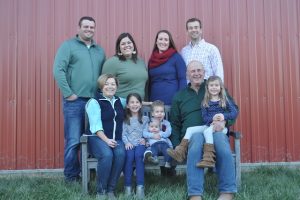EUKEN-MYERS FAMILY NAMED 2020 IOWA ENVIRONMENTAL STEWARDSHIP AWARD WINNERS
April 22nd, 2020 by Ric Hanson
Officials with the Iowa Cattlemen’s Association report the Euken-Myers family from Cass County, have been selected as the 2020 Environmental Stewardship Program Award Winners. The ICA chooses an outstanding cattle operation to nominate for the regional award each year. The regional winners for the national award will be announced in late July. The Eukens and Myerses will compete against nominees from Missouri, Minnesota, Illinois, and Wisconsin.

Euken-Myers families from Cass County (Photo courtesy ICA)
The National Cattlemen’s Beef Association’s (NCBA) Environmental Stewardship Awards Program (ESAP) began 28 years ago, long before sustainability was a buzz word. The ESAP program was meant to highlight conservation efforts and recognize outstanding beef farmers who care for the land with as much dedication as they care for their livestock. Six regional winners are recognized at the national level, while one of those is selected as the winner.
Beef production has been a life-long learning opportunity, passion and revenue stream for the Euken-Myers family. Randy and Jill Euken grew up with cattle on family farms and showed cattle as 4-H’ers. Their own farming operation was launched in 1978 when Randy started his farming career and purchased half of the cow herd from his landlord. Over the past 40 years, they have continued to grow and improve their cattle herd by carefully selecting replacement heifers and bulls, keeping and utilizing an extensive set of records, implementing the best practices for environmental stewardship and carefully tending to beef nutrition and herd health. These efforts have resulted in continued improvement in the performance and ROI for their operation and their reputations as good stewards of natural resources, life-long learners and good neighbors.
Now, the family has put in place a farm transition plan that is transferring management and operation of the beef and farming enterprises to their daughter and son-in-law. Over the past three years, Michelle (Euken) Myers and Steve Myers have purchased and improved their own farm and purchased half of the Eukens’ cow herd. They are retaining ownership of their calves in the family feedyard and are carrying on the legacy of environmental stewardship in their farming and cattle enterprises. Located in southwest Iowa, the farm has a long history of row-crop and cattle production. Jill’s great grandfather and his sons bought the home farm in 1912, and it has remained in the family ever since. Now, more than 100 years later, the Myerses are the 5th generation in the family to earn a living from the farm. Throughout that time, the farm has included both row-crops and cattle. The land is utilized with erosion and water quality in mind, with the highly erodible ground growing pasture or hay. The Eukens and Myerses currently have approximately 165 cows and 30 head of replacement heifers. They also feed out their own calves and others in a 400 head feedlot, and purchase feeder cattle that are custom fed elsewhere. The family manages pasture and hay ground in addition to row-crops. The row-crop acres are farmed with an extended rotation including alfalfa hay.
In the past few years, there has been an increased focus on climate change by politicians, academicians, and activists. Many of the practices the Eukens and Myerses employ on their farm mitigate climate change in one of two ways: reducing emissions and sequestering carbon. Reducing emissions has become front and center for the agriculture industry today. Efficiencies in production and equipment have been the most visible change in emission reduction. Farmers and cattle producers have been tasked for years to be more efficient and produce more to feed the world. Livestock producers have become the most diverse of all farmers as they utilize their crops to feed their animals, manure to feed their crops, and cover crops to sequester carbon/nutrients and also feed their livestock. The Eukens and Myerses utilize many practices on their row-crop operation to reduce emissions, including improvements to their grain-drying systems and reduced tillage. Increased yields over the years have also reduced emissions on a per acre or per unit level.
Sequestering carbon may not have as much of a direct influence on a farmer’s bottom line, but it is another way that the Eukens and Myerses have improved their impact on climate change. The land has an incredible ability to store and utilize carbon, but certain farming practices can increase or decrease carbon sequestration. Through cover crops, minimum tillage and application of manure, the Eukens and Myerses have been able to increase soil organic matter. This increase in organic matter has made their land more profitable and healthy, and has increased its ability to store carbon.
The family has been able to utilize these healthy soils to more sustainably grow crops, feed cattle, and help keep the carbon in the soil and out of our atmosphere. Cover crops have become a big part of no-till, organic, and livestock production the last couple of years. A big part of this reason is due to the efficiencies and unique tools that cover crops provide. Feed, bedding, tillage, and increased organic matter are just a few of the examples of what cover crops provide, including various ways for a farmer to be more sustainable.
Cattlemen are often considered the original stewards of the land. And with progressive, responsible cattle producers like the Eukens and Myerses, it’s easy to see why.





